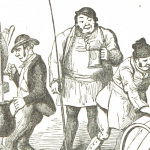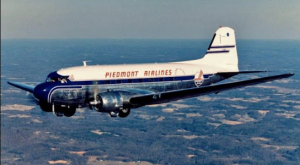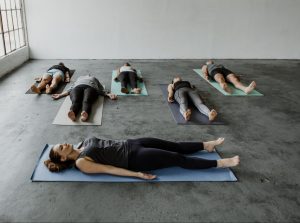
Last Days of the Yard King
By Jim Dodson
That July I owned the neighborhood. Or at least my block in Starmount Forest.
It was 1968. I was 15, towing an aging Lawnboy push mower behind a well-traveled Schwinn Deluxe Racer with chrome-plated fenders and dual side baskets. My mother called me Jimmy the Yard King.
Actually, I had several jobs that summer. One was mowing half a dozen lawns up and down our street for five bucks a yard. Another was planting Christmas trees at a farm overlooking Lake Jeanette. I also snagged a weekend job as an usher at the newly opened Terrace Theater, one in which I was required to wear a tangerine orange double knit sports jacket that matched the theater’s innovative “rocking chair” seats. My job was to keep kids from violently rocking their brains out and disturbing other customers by banging their knees.
That summer I also had my first job teaching guitar on Saturday afternoons at Mr. Weinstein’s music shop, another glorious five-dollar-per-hour gig.
I was rolling in dough. Or thought I was. My mom joked that she might someday ask Jimmy the Yard King for a loan. But I was saving up for either a new Alvarez guitar like Graham Nash played or a new Chevy Camaro, whichever came first.
That year, 1968, has been called the “Year that Shattered America.”
Looking back, it was the year we both began to lose our innocence.
Being a son of the newspaper world, I paid close attention to the news, read the paper daily and never missed Uncle Walter’s CBS evening newscast.
For the first time, television news brought the horrors of the war in Southeast Asia home to 56 million American TV sets. On my birthday that February, in Time Magazine, I saw the iconic photograph of a South Vietnamese general publicly executing a Viet Cong prisoner. That photo shocked Americans, stoked the anti-war movement and sharply turned millions of everyday citizens against the war. One month later, the Mai Lai massacre that killed 500 civilians, though the atrocity wasn’t revealed and investigated for another year. These events finished off public support for the undeclared war.
That spring I taught myself how to play every song on the Beatles’ Sgt. Pepper’s Lonely Harts Club Band and started performing around town with my buddy Craig Corry who lived two doors away on Dogwood Drive. We wound up placing third in the City’s Teenage Talent Show that next fall and made an appearance on Lee Kinard’s “Good Morning Show,” our first and last moment in the spotlight.
On a breezy afternoon that April, I was playing golf with my dad when we heard that Martin Luther King had been assassinated In Memphis. We watched riots break out in Detroit and coverage of the Poor People’s March on Washington. Commentators wondered if America was coming apart at the seams, heading for revolution in the streets.
Barely a week after he announced that he wouldn’t run for re-election, President Johnson signed the historic Civil Rights Act. The musical Hair opened on Broadway featuring live naked people on stage singing about the “Age of Aquarius, An anthem for a dawning age of peace, tolerance and brotherhood. I started growing my own hair long that summer.
On the plus side of the summer America was going to hell in a hand basket, I took Ginny Silkworth to the Cinema Theater to see Franco Zefferelli’s Romeo and Juliet. Since this was a first date for us both, my dad had to drive us to the theater under strict orders not to say anything embarrassing. Because of that movie, I fell in love with the language of Shakespeare and, in a way, with Ginny Silkworth, too.
She hailed from somewhere up north and had the Yankee accent and direct manner to prove it, a deep thinker with a warm and horsy laugh. After the movie, as we waited for my old man to pick us up, Ginny wondered what I planned to do with my life. She was always asking questions like that.
I mentioned that I hoped to write spy novels and adventure books, travel to the ends of the Earth, compose country music songs, mow lawns and possibly move to either Nashville or England. She punched me on the arm and gave her horsy up-north laugh, pointing out that she intended to keep tabs on me to see if I did any of the above.
“If you want,” she suddenly declared, direct as ever and completely out of the blue, “you can kiss me.”
So I did. Another first.
In fact, Ginny and I stayed in touch for decades. She went on to become a gifted school teacher in Philadelphia and lived a very full and rewarding life, passing away from breast cancer a few years back. I still miss her, my Shakespearean first date, my first kiss, her warm and wonderful up-north laugh.
That same summer Robert Kennedy was gunned down after winning the California presidential primary. My mom had a thing for Bobby Kennedy. We watched his funeral train together and she cried. My dad was a half-hearted Nixon guy. My mom used to joke that she did her patriotic duty by cancelling out his vote every four years at the polls.
By July I was deep into my lawn mowing life, guitar-playing, writing bad country music songs and reading spy novels, trying to forget what was going on in America. I hated the usher job at the terrace so much that I handed in my elegant orange usher’s jacket in early August, blaming my family’s annual beach trip to the Hannover Seaside Club at Wrightsville Beach.
We’d gone there every year for half a dozen years, though this would be our final time. I loved the Seaside’s simple unfancy dining room, its cool wooden floors and big porches where I could sit for hours in a real rocking chair reading Graham Greene’s The Heart of the Matter or John LeCarre’s The Spy who came in from the Cold, picturing myself mowing a lawn in some far-flung, sun-mused outpost of the British Empire, a spy in short-pants and boat shoes, enjoying a gin and tonic with some sultry blond who looked like Tuesday Weld or at least Ginny Silkworth.
That week a family from Southern Ohio showed up at the Seaside Club. A pretty girl named Sandy was reading Edward Abbey’s Desert Solitaire, bare feet tucked up in the rocker just down the porch. We struck up a conversation and took a walk to the end of Bobby Mercer’s pier. Sandy told me that we human beings were destroying the natural world, killing the oceans with our garbage and fighting an unwinnable war. She told me she was going to become an “environmental activist” like her aunt who was presently attending the Democratic Party Convention in Chicago as a delegate from Ohio.
The Seaside Club didn’t have a TV set, so there was no way to see what was happening up in Chicago. We heard, however, that there were police riots and lots of injuries at the convention after Chicago’s mayor turned the police loose on protesters and Students for a Democratic Society who attempted to crash the party.
For the rest of the week we were pretty much inseparable. Sandy was a year older and half a head taller than me. She was no Tuesday Weld or Ginny Silkworth but I liked her a lot. She was crazy about books and movies.
The Graduate was playing at the Crest Theater in Wrightsville Beach. She suggested that we go see it. This was the year that the Motion Picture Association of America instituted its film rating service, serving as a guideline for parents anxious about a movie’s questionable content. I secretly worried about getting in. You were supposed to be at least 16 but the old lady working the box office took one look at Sandy, then me, and let us in for a buck and a quarter each.
The night before Sandy’s family headed home to Ohio, we talked until midnight while seated on a stack of canvas rafts stacked beneath the Seaside Club. I don’t remember what we talked about, probably her plan to save the world or mine to travel it. We promised to keep in touch.
My family was staying through the Labor Day weekend. The next evening, I gigged a huge flounder in the tidal flats off Bald Head Island and wondered if I would ever hear from Sandy again. She actually wrote me a couple times and I wrote her back. Some years later an F5 tornado flattened her hometown of Xenia, Ohio, killing hundreds of people and leaving 10,000 homeless. I never heard from Sandy again. I like to think she’s somewhere out there in the world doing her best to save the planet.
Back home, with school starting, I still had a few weeks of decent lawn-mowing income to count on, plus teaching guitar for Mr. Weinstein. That summer had clearly changed me. By then I knew all the dogs in the neighborhood, for example, those which were friendly and those that weren’t. I also knew the friendlier and better-looking moms, too. When you’re 15 and have begun dating smart and pretty girls, you notice such things.
Looking back from half a century, however, I realize how deceptively simple my life was that extraordinary summer safely removed from the anti-war protests, the burning cities, the murder of visionary politicians and Civil Rights leaders, the raised fists at the summer Olympics, Nixon winning the White House, O.J. winning the Heisman. Without realizing it at the time, these things changed me as well.
The singer Mary Chapin Carpenter has a poignant song about that fevered summer in the changing life of America. It’s called “Stones in the Road.” Every time I play it – which is fairly often these days – I think of that faraway year when America and I both lost our innocence.
“And stones in the road, flew out beneath our bicycle tires…Worlds removed from all those fires as we raced each other home…”
I rode my bike everywhere that summer, pretty much for the last time.
I mowed lawns, ate my first Big Mac, kissed Ginny Silkworth and had something awakened in me by a spirited girl named Sandy. I taught myself to play every song on “Revolver” and went to Scout camp for the final time, did the Mile Swim twice, finished off my Life Scout award, and built a nature walk at my elementary school for my Eagle project.
The Yard King’s days came to an end.
Since then, one thing I’ve learned is that history may not repeat but itself but certainly rhymes like a Mary Chapin song.
“And the stones in the road, leave a mark from whence they came / A thousand points of light or shame – baby, I don’t know.”
This edition of Simple Life first appeared in August 2018.





